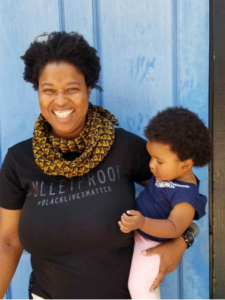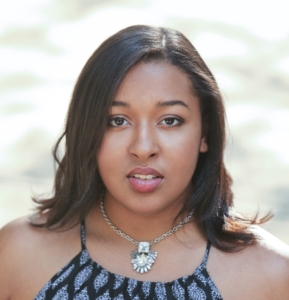LitDish: Four Questions with Povi-Tamu Bryant, Activist, Artist, Author
 Power and vibrance dominate the intellectual discussions in the workshop taught by Povi-Tamu Bryant. When we sit down for this interview, they appear ready to continue the intellectual discussion that came to an end only a few minutes ago. I would like that too, but other questions bob at the water’s edge.
Power and vibrance dominate the intellectual discussions in the workshop taught by Povi-Tamu Bryant. When we sit down for this interview, they appear ready to continue the intellectual discussion that came to an end only a few minutes ago. I would like that too, but other questions bob at the water’s edge.
Equity, inclusion, and solidarity are at the center of Povi-Tamu Bryant’s work and the workshop they’re teaching, one catering to bright-eyed caffeinated MFA students, looking to better the world through creative writing. A queer person and parent of color, they are striking in their embodied fusion of comfort and critical thinking. The moment they open their mouth, decade-old wisdom is dispensed.
- How did your journey toward equity and inclusion begin?
I’m one of six children. So I think I understand the need for embracing difference in an instinctual way. It comes from my experience of being “the oldest daughter.” In my family, even though I’m a middle child, I was often treated like an oldest child because I was the oldest daughter. For me, my socialization came from being told that as the oldest, I’m a role model and I’m supposed to support and protect my siblings. But my version of “protect and support” maybe wasn’t the version my parents imagined. To me, it was about creating a world that all of my siblings could move through as they wanted. Because at the end of the day, that’s what it means to be free. For me, the question was: How do we come to a place where we can show up for and with each other?
My sibling pod is also where I learned and how I continue to learn what solidarity action looks like and means. How do I show up for and support my siblings so that they get the things they need? And how have I seen them show up for and support me?
- What has your solo parenting journey been like?
It’s been something else, to be honest. When I made the decision to give birth, I was thinking about this notion of the village. My process has always been about the village, the community.
For me, as a solo parent, it’s been interesting to see what supports have come to life, what supports diminished, all that kind of stuff. Most of my other friends who are queer racially-marginalized parents are in partnerships, and so I’ve thought a lot about what it means for me to be intentionally doing this on my own. I’ve had to figure out how to be present for my kid in the way I want to be present for my kid while also making sure we have all the resources we need. I don’t get to split the labor. It’s been fun. I say all of that with lots of love and very little critique.
One of the things that’s been really helpful for me, and I hope it informs how my little one feels about having a solo parent, has been that I made this choice. I don’t feel resentful that I’m in the parenting game on my own. I chose this. I feel really excited and joyous about being in this.
One thing I’ll say—I didn’t imagine that becoming a parent would become such a big part of my identity. It has actually, in some ways, become more primary than any other identity I have, which I did not expect at all. Now, when I think about writing, everything I want to write about has to do with parenting from this particular vantage point: trying to raise a black kid in a way that’s gender expansive.
- Our ideas about parenthood in America are very anchored in gender, motherhood, fatherhood. I hope this isn’t too personal, but what does your kiddo call you?
I love this question! It’s legit. Recently my kiddo has started watching more TV. A lot of their exposure to parenthood formation comes from the language in these shows—kids calling their parents mommy and daddy. My kid learned to call me by my name, Povi. But this thing has started happening in recent months where they’ll say “Mom” or “Mommy.” And I’ll say, “Who are you talking to? Who is that person?” They started saying it like they were calling me. One of the conversations that I still remember was actually with my midwife, and she had a three-year-old at the time, and she shared, “You know… your kid is going to call you what your kid is going to call you. And you’re probably just going to let it happen.” And so I had that in the back of my mind when kiddo first started doing the mom stuff. And then I was like “No, I absolutely do not feel okay with this.” (Laughter) We’ve been having more intentional conversations about “Povi is a parent.” They’re starting to use pronouns more. They just mix everybody’s pronouns up. They’ll use he, she, they, them for anyone. They just mix it up. For themself, for me, whatever. Just stick a pronoun there. We’ll see, as they get older.
- What are your hopes for the generation of writers that are out and about right now?
One of the things I’m thinking most about for writers is the idea that what you’re creating has more resonance and longevity when you use an inclusive framework or lens. I was thinking about Langston Hughes, Countee Cullen, Alice Walker, Audre Lord, writers whose works has stuck with me, writers whose work I imagine will stick with people through generations. Adrian Marie Brown, Octavia Butler. I think the question for writers is what do you want the legacy of your work to be? And how can approaching your work through an inclusive solidarity-driven cultural humility framework actually support the expansiveness of your legacy? I want writers to sit with that, to let that shape their writing. What’s the legacy of your work? What’s the legacy you want to leave behind? How does your writing espouse your values? I think that you can push and challenge people and be in solidarity. Those aren’t mutually exclusive things.
Povi-Tamu Bryant is a black, queer, gender nonconforming person and parent who is committed to working with people to bring an intersectional understanding to the ways we build and interact with each other. From facilitating strategic vision processes to designing leadership development programs for marginalized communities, Povi-Tamu has worked with a diverse set of needs and struggled with leaders to best address them. Povi-Tamu is currently bringing all of their experience and skills to their work as a Leadership, Diversity and Equity Consultant for Freedom Verses, which they co-created. You can reach them at
.
Regan Humphrey is the founder of Wrico, a creative consulting firm that offers resources to creative writers at every stage of the writing process, including productivity coaching, manuscript editing, and writers’ therapy. Currently, she’s an MFA candidate at Antioch University Los Angeles studying Young Adult fiction and Playwriting. She holds degrees in marriage & family therapy, cultural anthropology, creative arts, and performance. She is a writing mentor, film-enthusiast, music-buff, and longtime performer.





